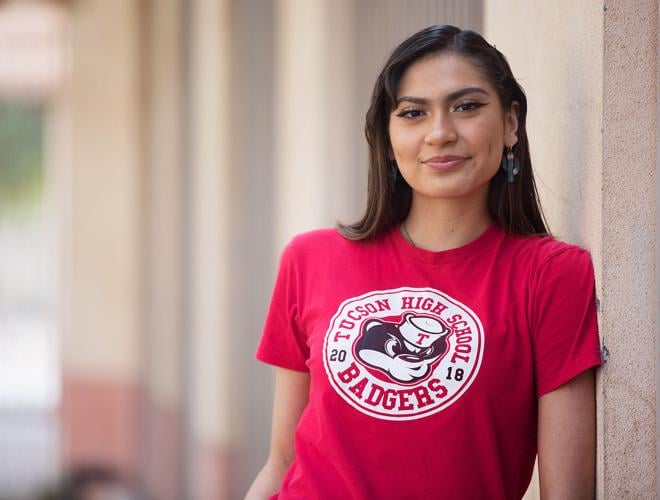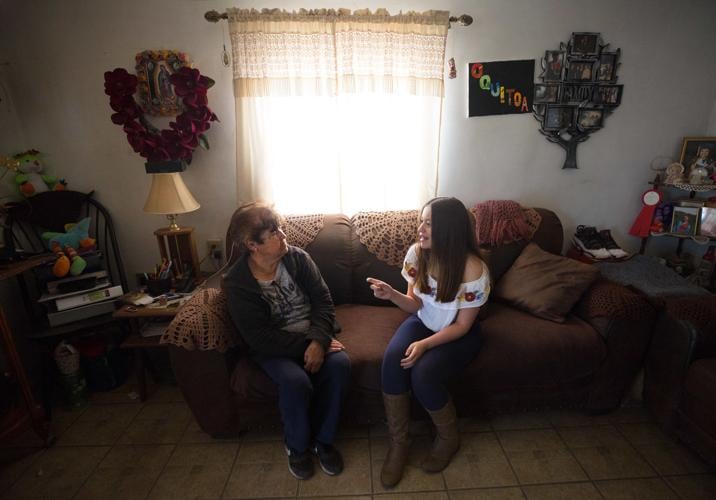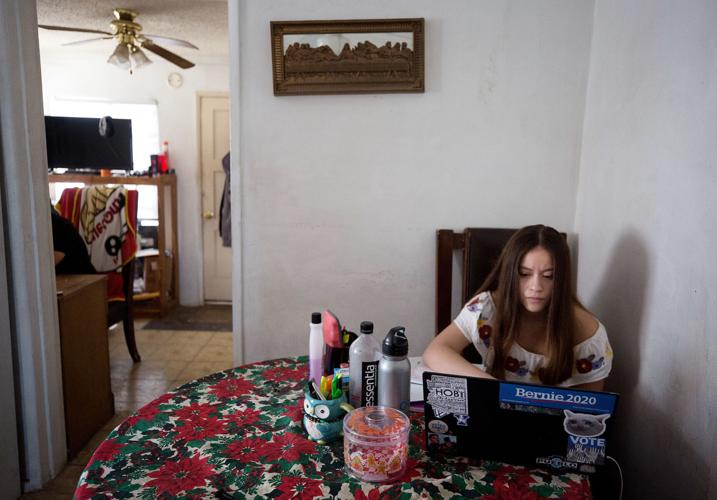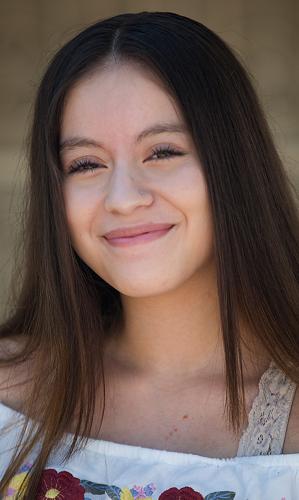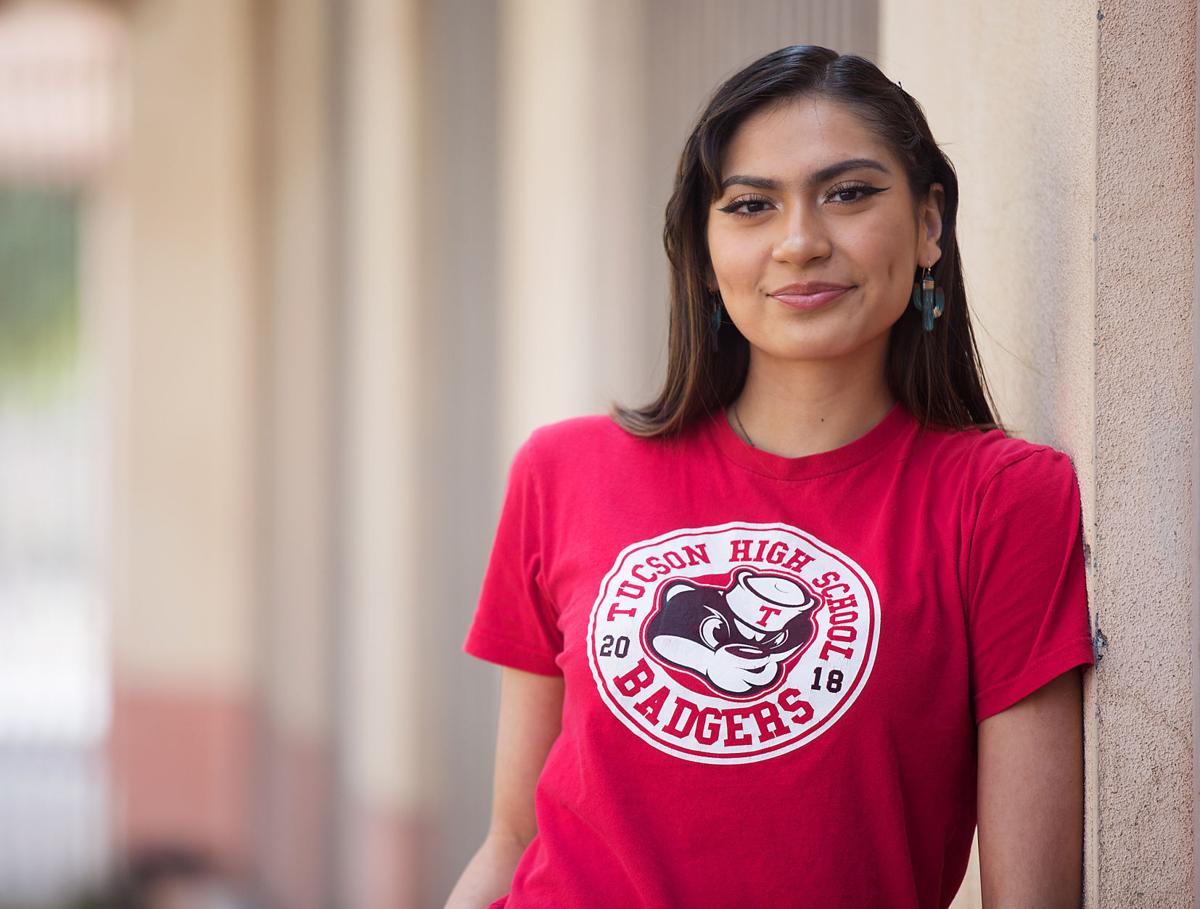ENGLISH VERSION BELOW
Ya sea que Yakeleen Almazán esté hablando sobre su beca completa para Yale o el grupo de acción estudiantil nacional que cofundó durante la pandemia del COVID o de su trabajo de defensa para aumentar la eficacia política de la comunidad latina, ella es cálida y vibrante: una adolescente que sabe exactamente a dónde va y por qué.
“La legislación tiene mucho que ver con todos los aspectos de la vida que mucha gente no se da cuenta”, dice. “Es por eso que continúo con estos esfuerzos, para demostrar eso a la gente, y que tienen una voz en ello y especialmente en mi comunidad, que tiene muchos inmigrantes mexicoamericanos”.
La primera vez que conocí a Almazán fue durante el apogeo de la indignación pública por el asesinato de George Floyd y la protesta nacional para desfinanciar a la policía. La mesa directiva del Distrito Escolar Unificado de Tucson (TUSD) estaba considerando retirar a los oficiales de las escuelas, cuestionando si tenerlos en los campus perpetuaba el racismo y el trauma sistémico en un país donde las personas de color son blanco desproporcionado del sistema de justicia.
En su calidad de copresidenta de MEChA de Pueblo High, una organización juvenil de justicia social, Almazán ayudó con una petición que obtuvo casi 2,400 firmas pidiendo que los oficiales fueran retirados de los campus escolares. Más adelante, la mesa directiva votó para mantener a la policía en los campus en una capacidad más limitada.
Luego, comencé a ver aparecer el nombre de Almazán en comunicados de prensa de escuelas y organizaciones que anunciaban a los ganadores de prestigiosas becas universitarias.

Yakeleen Almazán, de 17 años, y sus tres hermanos han sido criados por sus abuelos desde hace varios años.
Finalmente nos conocimos en persona hace un par de semanas en un patio ventoso de Starbucks en el lado sur, cerca del McDonald’s donde Almazán trabaja el turno de noche y cerca de la casa donde su abuela los crió a ella y a sus tres hermanos. Y muy cerca se encuentra el despacho del congresista Raúl Grijalva, donde un año antes Almazán se dio cuenta de lo que quería hacer con su vida.
La mejor estudiante de Pueblo High irá a Yale en el otoño para estudiar ciencias políticas, con una doble especialización en educación o sociología.
Su impresionante currículum incluye la tutoría de jóvenes estudiantes y compañeros a través del Lapan College Club y Americorp, trabajo de defensa de base para políticas progresistas y candidatos políticos, sirviendo como presidenta de MEChA y el club de ciencias de Pueblo High (no solo porque ama la ciencia sino también para aumentar la representación de los latinos en las ciencias la tecnologóa, las ingenierías y las matemáticas, STEM) y la fundación de la Organización Nacional para el Activismo Juvenil. Todo ello le ha valido un viaje completo a Yale, junto con $25,000 de la Beca Nacional Horatio Alger y el haber sido elegida finalista por otras tres prestigiosas becas.
“Durante COVID, especialmente con todo el tiempo que tuve para reflexionar, me di cuenta de que definitivamente no hacía todas estas cosas solo para ponerlas en mi currículum”, dice Almazán. “Creo que mucho de eso tuvo que ver con mi amor y deseo de ayudar a la gente”.
Sus abuelos, ambos inmigrantes mexicanos, criaron a los cuatro hijos después de que los sacaron de la casa de sus padres en 2012 debido a la violencia doméstica y el abuso de sustancias, cuando Almazán tenía 9 años.

Yakeleen Almazán vivió en medio de violencia doméstica, fue criada por sus abuelos, estudia, trabaja, ayuda y piensa ser política.
“Mi motivación interna fue dejar este molde que ha sucedido en mi familia”, dice. “Tenemos un historial de violencia doméstica, que se remonta al menos a cuatro generaciones del lado de la familia de mi mamá. Entonces, después de que fui desplazada y mis dos padres biológicos fueron encarcelados, supe que quería lo mejor para mí y lo mejor para mi familia. Y entonces encontré la educación como mi medio para hacerlo”.
Cuando le pregunto a Almazán si sabe lo que quiere hacer con su vida, dice que sí antes de que termine la frase.
Al empezar la escuela preparatoria (high school), quería convertirse en investigadora de biología molecular y celular, pero todo eso cambió cuando comenzó a tocar puertas en 2019, solicitando el voto para la entonces candidata a la alcaldía de Tucsón Regina Romero.
“Me di cuenta de que las interacciones que tenía con sus electores y el impacto tangible que tenía en mi comunidad se sentían diferentes a las de mí sentada en un laboratorio con una bata de laboratorio y un microscopio”, dice. “Se sintió diferente. Y para mí, lo que personalmente me llenó fue hacer activismo y hablar con mi comunidad”.
Casi al mismo tiempo, formó parte del Consejo Asesor de la Juventud del congresista Raúl Grijalva. Ella fue una de más de veinte estudiantes que dieron su opinión al congresista sobre una serie de temas, desde los derechos LGBTQ hasta la crisis de los opioides.
“También le escribimos memorandos, para que pueda llevárselos a Washington, DC, cuando vote, porque esencialmente votaría en nuestro nombre”, dijo.
Almazán se sintió envalentonada al ver que los líderes latinx (término incluyente utilizado para incluir a todas las personas de origen latino) influyen en las políticas públicas y representan a sus comunidades en general. Y le encantaba la oficina de Grijalva y el centro comunitario al lado.
“Me sentí como en mi segunda casa”, dice. “Y al estar en el medio de mi comunidad y tener esa interacción con las personas a las que servía, fue entonces cuando me di cuenta de que eso era lo que quería hacer”.
Así que va a hacer una carrera en política, con la intención de un día representar al distrito de Grijalva, el Distrito Congresional 3.
Cuando la pandemia golpeó, Almazán sintió que su vida estaba en suspenso, ya que todas sus actividades extracurriculares se detuvieron abruptamente y la escuela empezó en línea. Y su familia tuvo algunos desafíos.
Tenía una computadora portátil que compró con el dinero de una pasantía de investigación de verano en la UA, pero sus hermanos menores no tenían ninguna para tomar clases en línea. E incluso cuando finalmente obtuvieron computadoras portátiles a través del TUSD, les tomó tiempo acostumbrarse a la escuela remota.
Luego, el abuelo de Almazán murió en junio. Ya eran un hogar de bajos ingresos, y sin su tata, el dinero era aún más ajustado.
Entonces, Almazán consiguió un trabajo y comenzó a contribuir con los gastos del hogar. Y aunque fue difícil ver a sus hermanos batallar con las clases en línea, el tiempo los acercó más, ya que estaban todos juntos en casa.
Sin apresurarse en todo el día, Almazán comenzó a medir el éxito de cada día por la cantidad de personas a las que podía ayudar, incluso si solo estaba ayudando a un compañero de estudios con una tarea.
“Me hizo realmente feliz ayudar a otras personas a mi alrededor a lograr sus propias metas, a ser sus propios líderes y ser buenos estudiantes”.
Líderes de hoy
Azul Navarrete-Valera es otra adolescente de Tucson enfocada en ayudar a los jóvenes a realizar su potencial como líderes comunitarios, a través del trabajo que está haciendo con The Youth Advocacy Group.
“Todo el mundo es un líder, pero ¿cómo vas a encontrar qué tipo de líder eres?” ella dice. “Eso es lo que estamos tratando de hacer. Estamos tratando de hacerlo más fácil y ayudar tanto como sea posible”.
La estudiante de último año de Tucson High es copresidenta del Tucson Native Youth Council (Consejo de Jóvenes Nativos de Tucsón), y enseña no violencia y activismo no violento a través del Programa Nonviolence Legacy.
Como líder juvenil latina, Navarrete-Valera está trabajando para empoderar a los líderes jóvenes y aumentar la representación de los jóvenes para las comunidades nativas y las comunidades minoritarias.
“No es correcto decir que serán los mejores líderes del mañana; no, son los líderes de hoy”, dice. “Quiero difundir ese mensaje tanto como sea posible, porque es realmente importante para ti estar empoderado ahora y no más tarde”.
Antes del COVID, Navarrete-Valera había estado asistiendo a un montón de reuniones: clubes, trabajo de promoción y orquesta, tocando el violín. Cuando todas las reuniones empezaron a ser por Zoom, le resultó difícil mantenerse motivada. Extrañaba las recaudaciones de fondos para la orquesta y las conferencias internacionales, e incluso el poder saber si un amigo necesitaba que le dieran ánimos, algo que es más difícil de ver a través de una pantalla.
Siendo hija única, se sentía aislada e incluso luchó algunos días para encontrar una razón para levantarse de la cama. Pero se inspiró en su madre, Patty Valera. Navarrete-Valera vio a su madre, una trabajadora social de los veteranos (VA), levantarse todas las mañanas, comer un desayuno saludable, hacer ejercicio y ayudar a la gente en su trabajo.
“Definitivamente, es una persona a quien admirar”, dice Navarrete-Valera.
Su mamá seguía diciéndole que hiciera una rutina. Navarrete-Valera comenzó a ir al gimnasio todos los días una vez que reabrieron, comiendo más saludablemente y preparándose para ir a la universidad en el otoño, donde planea estudiar leyes y convertirse en abogada de inmigración.
Para Almazán, perder el sentido de la rutina también fue un obstáculo que tuvo que superar durante la pandemia. Comenzó a cuestionar su propósito.
Empezó a trabajar como voluntaria en Fight For Her Foundation, una organización que aboga por la salud y los derechos reproductivos de las mujeres en todo el mundo.
Y aunque le resultó difícil hacer ese tipo de activismo sin ver a la gente cara a cara, se hizo amiga de las personas a las que conoció a través de este trabajo y todas sueñan con el día en que se conocerán en persona.
Al adaptarse a la vida en la pantalla, Almazán extraña ver a sus maestros y a las personas con las que organiza la comunidad, pero se inspira en ellos y en esa actitud de “si se puede”.
“Se estaba poniendo muy difícil durante la pandemia”, dice. “Todos me lo demuestran, especialmente con mi pasado, si lo hiciste una vez puedes hacerlo de nuevo”.

Yakeleen Almazán platica con su abuela, Concepcion Almazán, en su casa en Tucsón el 10 de marzo de 2021. Almazán será reconocida con el primer lugar de su generación en Pueblo High School y asistirá a la Universidad de Yale.
ENGLISH VERSION
Latina youth cope with the pandemic and become today's leaders
Whether Yakeleen Almazán is talking about her full-ride scholarship to Yale or the national student action group she co-founded during COVID or her advocacy work to increase the political efficacy of the Latinx community, she’s warm and vibrant — a teenager who knows exactly where she’s going and why.
“Legislation has a lot to do with every aspect of life that a lot of people don't realize,” she says. “That's why I continue these endeavors, to demonstrate that to people, and that they have a voice in it and especially in my community that has a lot of Mexican-American immigrants.”
The first time I met Almazán was during the height of public outrage over the killing of George Floyd and the national outcry to defund police. Tucson Unified governing board was considering removing resource officers from schools, questioning whether having them on campuses perpetuated systemic racism and trauma in a country where people of color are disproportionately targeted by the justice system.
In her capacity as co-president of Pueblo High’s MEChA, a social justice youth organization, Almazán helped with a petition that garnered nearly 2,400 signatures asking that officers be removed from school campuses. The board later voted to keep police on campuses in a more limited capacity.
Later, I began seeing Almazán’s name pop up in press releases from schools and organizations announcing winners of prestigious college scholarships.
We finally met in person last week on a windy Starbucks patio on the Southside, near the McDonald’s where Almazán works the night shift and near the home where her grandmother raised her and her three siblings. And close by is Congressman Raul Grijalva’s office where a year earlier Almazán realized what she wanted to do with her life.
The Pueblo High valedictorian is going to Yale in the fall to study political science, with a double major in either education or sociology.
Her impressive resume, which includes mentoring young students and peers through the Lapan College Club and Americorp, grassroots advocacy work for progressive policies and political candidates, serving as president of MEChA and Pueblo High’s science club (not only because she loves of science but also to increase Latinx representation in STEM) and founding the National Organization for Youth Activism, has earned her a full-ride to Yale, along with $25,000 for the national Horatio Alger Scholarship, and being chosen a finalist in the running for three other prestigious scholarships.
“During COVID, especially with all the time I had to reflect, I realized that I definitely didn't do all these things just to put them on my resume,” Almazán says. “I think a lot of it had to do with my love and desire to help people.”
Her grandparents, both Mexican immigrants, raised the four children after they were removed from their parents’ home in 2012 due to domestic violence and substance abuse when Almazán was 9.
“My internal motivation was to leave this mold that has happened in my family,” she says. “We have a history of domestic violence, at least going back four generations on my mom's side of the family. And so after I was displaced and both of my biological parents were incarcerated, I knew that I wanted better for myself and better for my family. And so I found education as my means to do so.”
When I ask Almazán if she knows what she wants to do with her life, she says yes before I finish the sentence.
When she first started high school, she wanted to become a researcher of molecular and cellular biology, but that all changed when she started knocking on doors in 2019, canvassing for then-mayoral candidate Regina Romero.
“I realized that the interactions that she had with her constituents and the tangible impact she had on my community felt different than me sitting in a lab with a lab coat on and a microscope,” she says. “It felt different. And to me, what personally fulfilled me was doing activism and was talking to my community.”
Around the same time, she served on Congressman Raul Grijalva’s Youth Advisory Council. She was one of a couple dozen students who gave input to the congressman on a host of issues, from LGBTQ rights to the opioid crisis.
“We would also write memos for him, so he could take it with him to Washington, DC, when he votes, because he would essentially vote on our behalf,” she said.
Almazán was emboldened to see Latinx leaders affect public policy and represent their broader communities. And she loved Grijalva’s office and the community center next to it.
“It felt like a second home to me,” she says. “And being in the middle of my community and having that interaction with the people he served, that's when I realized that that's what I wanted to do.”
So she’s going for a career in politics, including one day running to represent Grijalva’s district, Congressional District 3.
When the pandemic hit, Almazán felt like her life was put on hold as all her extracurriculars came to an abrupt stop and school moved online. And her family had some challenges.
She had a laptop she bought with money from a summer research internship at the UA, but her younger siblings didn’t have any for online learning. And even when they eventually got laptops through TUSD, it took time for them to get used to remote school.
Then Almazán’s grandfather died in June. They were already a low-income household, and without her tata, money was even tighter.
So Almazán got a job and began contributing to the household expenses. And while it was hard to see her siblings struggle with remote learning, the time brought them closer as they were all at home together.
Without rushing around all day, Almazán started measuring the success of each day by the number of people she was able to help, even if it was just helping a fellow student on a homework assignment.
“It made me genuinely happy to help other people around me achieve their own goals, to be their own leaders and be good students.”
Azul Navarrete-Valera[cq] is another Tucson teen focused on helping young people realize their potential as community leaders, through work she’s doing with The Youth Advocacy Group.
“Everybody's a leader, but how are you gonna find what type of leader you are?” she says. “That's what we're trying to do. We're trying to make it easier and help as much as possible.”
The Tucson High senior is the co-president for the Tucson Native Youth Council, and she teaches non-violence and nonviolent activism through the Nonviolence Legacy Program.
As a Latinx youth leader, Navarrete-Valera is working to empower young leaders and increase youth representation for native communities and minority communities.
“It's not right to say that they will be better leaders of tomorrow — no, they’re the leaders of today,” she says. “I want to spread that message as much as possible because it's really important for you to be empowered now rather than later.”
Before COVID, Navarrete-Valera had been attending a ton of meetings — clubs, advocacy work and orchestra, playing violin. When they were all reduced to Zoom meetings, she found it hard to stay motivated. She missed fundraising for the orchestra and international conferences, and even being able to tell if a friend needed cheering up — something that’s harder to see through a screen.
Being an only child, she felt isolated and even struggled some days to find a reason to get out of bed. But she got inspiration from her mother Patty Valera. Navarrete-Valera watched her mom, a social worker at the VA, get up every morning, eat a healthy breakfast, workout and help people at her job.
“She’s definitely a person to look up to,” Navarrete-Valera says.
Her mom kept telling her to do a routine. Navarrete-Valera started going to the gym every day once they reopened, eating healthier, and preparing to head to college in the fall, where she plans to study law and become an immigration lawyer.
For Almazán, losing the sense of routine was also a hurdle she had to overcome during the pandemic. She started questioning her purpose.
She’s began volunteering with the Fight For Her Foundation, an organization that advocates for women’s reproductive health and rights around the world.
And though she found it challenging to do grassroots organizing without seeing people face to face, the people she met through this work became friends, and they all dream of the day that they’ll meet in person.
Adapting to screen life, Yakeleen misses seeing her teachers and the people she does community organizing with, but she’s inspired by them and that “si se puede” attitude.
“It was getting really hard during the pandemic,” she says. “They all demonstrate it to me — especially with my past — you did it once you can do it again.”


